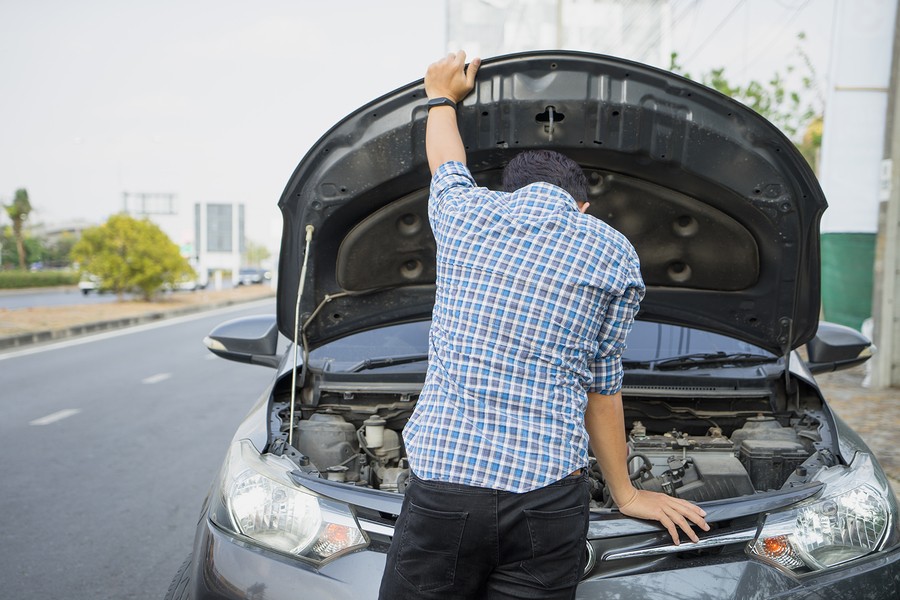A car engine is a powerful machine that needs to be taken care of to maintain its reliability and performance. It can be damaged if the temperature gauge goes above the normal operating range. In this article, we'll explore what an overheated car engine means, how you can tell if your engine has been overheating and how to prevent further damage from occurring. We will also go over some fixes for common causes of overheating cars. Read on for more details about “How Do I Tell If My Car Is Overheating?”

Why is car overheating a big problem?
Car overheating is a big problem because it can lead to many things going wrong with the engine. When a car overheats, it will not perform well and may not start or run at all. It can also lead to engine malfunctioning and problems that go along with that.
Car overheating requires very expensive repairs. For example, the head gasket can be damaged by overheating. This is a very expensive repair because the engine has to be taken apart to replace the part.
How Do I Tell If My Car Is Overheating?
Since car overheating is a big problem, every driver needs to understand the main symptoms of car overheating. These symptoms are not very hard to detect, and they include:
The engine is hot to the touch.
If you can touch the top of your engine after a short drive, then it is overheating. This symptom may also be a sign that the engine is getting old, but it will also be a sign of overheating.
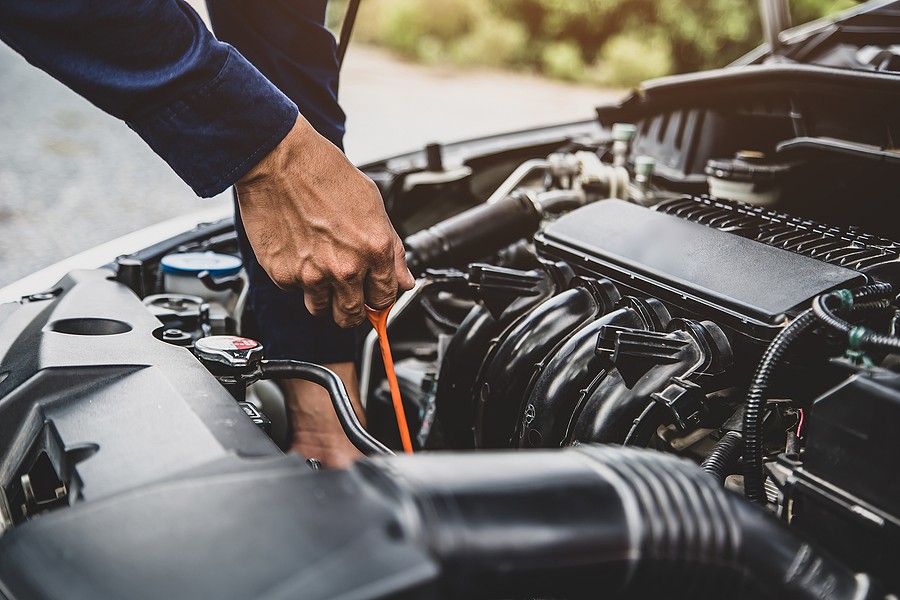
Reduced Engine Power
Driving your car with a temperature gauge above the normal operating range will reduce engine power. This may not happen when you first start driving, but it will probably happen after you drive the car for a while. This symptom is especially bad if it happens when you are driving up a hill, but it will happen on any incline.
Increased Coolant Temperature Gauge reading
If you notice that your coolant temperature gauge is reading higher than normal, it may indicate overheating. Since the car gauge only approximates the engine temperature, it will usually be higher than the actual temp. Therefore, it does not read exactly the engine temperature, but it will close.
Steam emitting from the exhaust
.Some overheating engines will produce steam that comes out of the exhaust. This will be a sign that your car is having an especially serious issue, and you should park the car and call a tow truck right away because it can lead to further damage. Taking your car in for repairs immediately after this symptom occurs is the only way to stop it from doing further damage.
The temperature warning light (if your car has one) is illuminated on the dashboard
Sometimes if the car is overheating, it will cause a warning light to appear on your dashboard. It may be flashing, which means that you need to pull over as soon as possible and call a tow truck.
If you notice any of these symptoms, it is time to pull over and park the car immediately. If you notice multiple symptoms, then it is likely that your engine is dangerously close to overheating or has already done so.
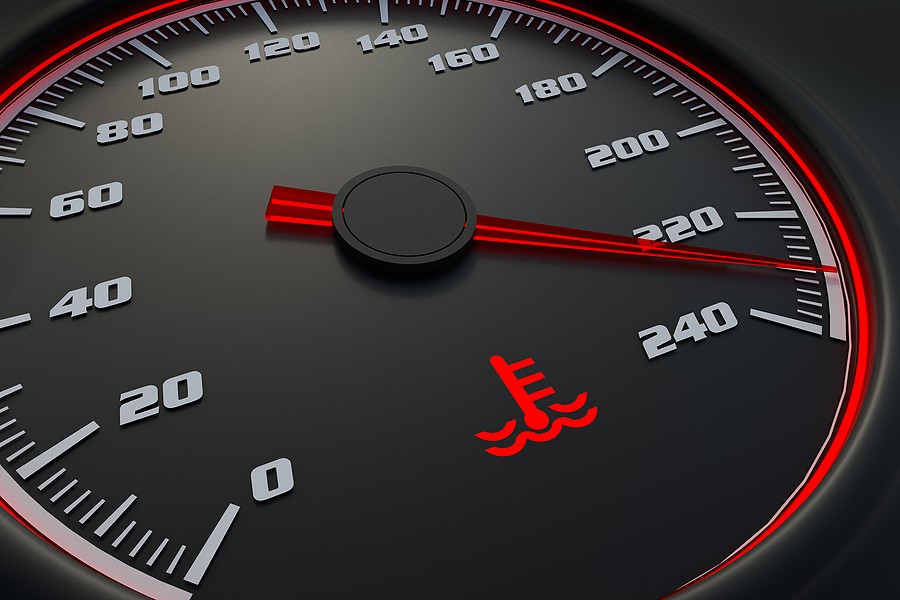
Loss of coolant
If you notice that your coolant has been leaking, then it is likely that your engine has overheated, and the head gasket may be damaged. This can be a very dangerous situation, and you should avoid driving the car until you have it taken care of by a professional.
Loose or damaged hoses
A loose or damaged hose can cause the engine to overheat. The radiator is directly connected to the engine, so if a hose comes loose or is damaged, it will cause the engine to overheat. If one or more hoses are loose or flapping around, they should be tightened or replaced.
Too much oil in the coolant mixture
The oil and coolant mixture should only be a little bit of oil for every gallon of water. If you notice more than a little bit of oil in the mixture, then there is a big problem. This can indicate that the head gasket has blown, which means that the engine is overheating. You need to take it in for repairs as soon as possible because the problem will only worsen over time.
Causes of engine overheating
Your engine should not overheat on its own. There are a few main things that can cause it to overheat, and they include:
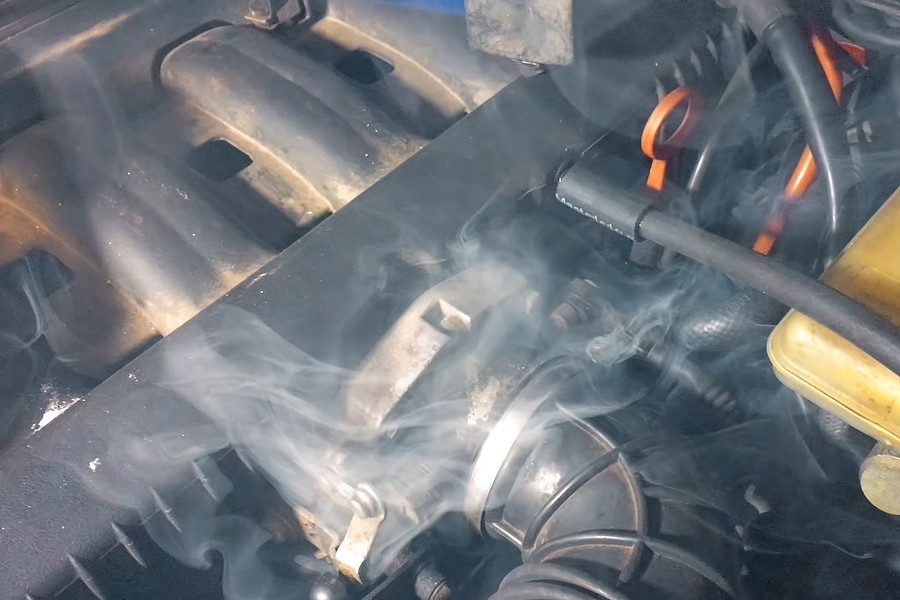
1. Losing Engine Coolant
The engine needs a constant supply of coolant to keep it from overheating. Since the car engine is hot and the parts move around, they will create friction which builds up heat. This heat must be removed from the engine by the cooler, and it does that with the help of coolant. If there isn't enough coolant in the system, this heat will build-up, and the engine will overheat.
2. Poor quality or old radiator cap
The radiator cap regulates the pressure in the cooling system and keeps it from building up to dangerous levels. If you notice that your car is overheating, try tightening the radiator cap to see if that resolves the issue. If it doesn't, there may be a problem with your radiator cap, and you should get a new one immediately.
3. Loose or damaged hoses
If one of your hoses is loose or damaged, then it can cause an increase in temperature, which leads to overheating of the whole engine. You need to check all of your hoses for excessive wear and tear every month so that this type of problem does not occur. If a hose is split or badly worn out, then you should replace it right away to avoid engine overheating.
4. Oil in the coolant liquid
The liquid going through your engine needs to be clean and pure so that it keeps your engine from overheating. If you notice that there is oil in the liquid, then it means that one of your seals has blown, which can lead to serious problems with your car. You need to take the car to a mechanic immediately because if not done properly, this can cause damage to other parts of the engine, leading to overheating issues.
5. Clogged radiator
Sometimes the radiator gets clogged up and doesn't allow enough air through to do its job of cooling the engine. This is very dangerous and can cause your car to overheat in a matter of minutes. If you notice that your radiator doesn't appear to be doing its job, then it may be clogged, and you need to get it unclogged as soon as possible.

6. Faulty water pump
The water pump is connected to the engine via a belt and plays an important role in keeping the engine from overheating. A faulty or loose water pump can cause serious damage to the entire engine, including overheating. You need to monitor this part regularly for any problems and changes in performance because it can lead to some big problems if not repaired on time.
7. Blocked air vents
The air vents allow the engine to breathe properly by being clogged up. They usually get blocked with dirt, leaves, and other unwanted things, which prevents the right amount of air from entering the engine. The proper flow of air is necessary to keep it cool, so if there is any blockage in this area, you need to remove it as soon as possible to avoid overheating issues.
8. Overuse of car
If you notice that your car tends to overheat when you drive it more than normal, you should look into getting a new one because this means that your current car cannot handle that kind of stress on its engine. You can save yourself the trouble by checking the performance level before buying a car so that you know what to expect when driving it in the future.
9. Faulty electric cooling fan
The electric cooling fan keeps the engine cool by switching on and off depending on how hot the engine is. If this system fails, your car engine will overheat very quickly because the air coming into it doesn't get cooled as it should. You need to watch out for symptoms of faulty electric cooling fans such as loud noises or vibrations when the fan switches itself on, and make sure you replace it immediately.
10. Low transmission fluid
If there isn't enough fluid in your transmission system, your car will lose power and cause overheating issues with time. Make sure that you check the fluid levels regularly and replace them if needed because this can be a very costly repair job if not taken care of right away.
How to fix engine overheating?
Fixing engine overheating is not a straightforward job, and it depends heavily on the root culprit of the problem. There are some common issues which we will discuss here and their fixes:
1. Check all your hoses
When you experience overheating issues with your car, the first thing to do is to check all the hoses because they can crack or split with time. You will need to replace them as soon as possible so that the internal parts of your engine are protected. The hoses carrying the coolant need to be checked first because if they split, you could end up with something very serious happening to your car. Ensure that you replace them right away or take them to a mechanic for inspection before taking them out on the road again.
2. Cooling system flush
Sometimes overheating issues can happen due to residue build-up inside the cooling system over time, which gradually reduces its overall performance. You need to get this cleaned by flushing out all the dirt and other parts using distilled water properly to avoid overheating problems in the future. This is an easy process and takes less than half an hour but make sure that you do it regularly so that your car doesn't run into any overheating problems in the future.
3. New radiator cap
If the radiator cap if your car is faulty and not working properly, it can cause overheating issues. You need to replace this part as soon as possible because the increased pressure levels inside the engine will cause serious problems if not resolved right away. This is a cheap fix for those who experience overheating often, but make sure that you get a new one from an authorized dealer only because many fakes don't allow proper pressure release inside the engine compartment, which can be very dangerous as well.
4. Flush out old coolant
If you notice that the coolant inside your car is turning a strange color such as brown, it means that it has been contaminated and needs to be flushed out immediately. You can check this by simply opening up the radiator cap and inspecting the level there. If you see residue all over the place, you need to change it right away because this will cause overheating issues very quickly unless resolved using distilled water and a new coolant mix.
5. Check internal engine components
Most people think that only the outside of an engine needs maintenance, but they forget about checking what's going on inside as well. If you experience overheating problems with your car more than normal, then you should take a look at all of its parts, such as gaskets, valves, and combustion chambers, to make sure that everything is working fine from the inside. You might find small metal particles stuck in between, which will block coolant flow and cause overheating problems with time.
6. Check the fan assembly
If you have a faulty electric cooling fan fitted on your car, this can also be a serious problem that causes overheating issues. Most owners ignore faulty fans only because they don't see any problems immediately after fitting a new one. Still, it can cost a lot to replace later if not taken care of right away using an engine diagnostic kit.
7. Air conditioning system
Some people like to keep their AC turned on even when driving in hot conditions because it helps cool the engine down. In reality, it only reduces the engine's overall performance and causes overheating problems with time. If you feel that your car is getting hotter after using the AC, it's best to switch off this system while driving in hot weather conditions or wait until it gets colder before using it again so that your car doesn't overheat easily.
8. Check for vacuum leaks
Vacuum leaks can also be a serious cause of overheating issues because they disrupt the internal airflow inside the engine, which results in insufficient cooling capabilities for some components. You need to take care of these tiny cracks as soon as possible to avoid any further issues, but take proper care using an engine kit to ensure that everything is fine.
9. Check the cooling fan clutch
If you find any problems with your car's cooling fan clutch, it can lead to overheating issues because this component controls the speed at which the cooling fan operates at all times. You need to check its proper function using an engine kit which will show you if there are any issues with this particular part of the system or not. If there are any problems, you should get them fixed immediately before they cause serious overheating problems later on during hot weather conditions.
10. Use of inferior gas
Many owners use regular fuel in their respective cars, but if you have a high-performance vehicle, it's best to use premium fuel only so that it doesn't cause overheating issues with time. Cheap gas can cause deposits to form inside the engine, which doesn't allow proper cooling capabilities, as usual, thus causing overheating problems with time if not addressed properly using a diagnostic kit from a trusted vendor over the Internet.
Here are some additional tips on how to plan for engine overheating repairs
1. You need to formulate a plan based on your car repair budget and timeframe.
2. If you manage to take the car into the shop and find out that the overheating is caused by one of these issues, they will charge you a fee for each issue as determined by the repair work needed.
3. This means that you can save yourself some money and time by formulating a plan and heading to the auto-shop at the right time to get it fixed.
4. You also need to make sure that you let the mechanic know if there is a history of overheating issues with your car so they can be more careful while doing their job.
5. Fixing small problems on the radiator, water pump, and other parts can save you from getting a new engine or transmission system, which can cost thousands of dollars in repair bills you will have to pay.
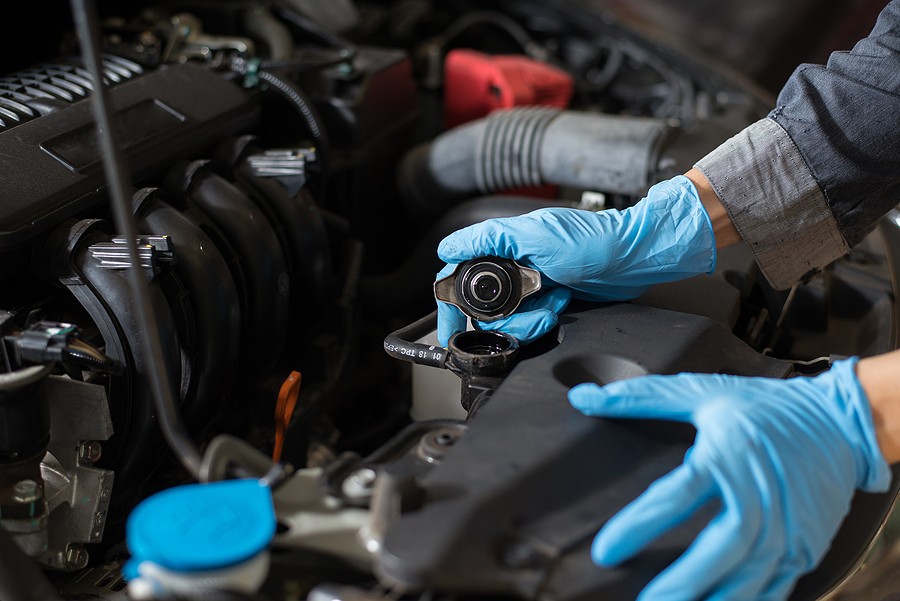
How to prevent engine overheating?
Did you know that there is a way to prevent engine overheating? Yes, it's true. All you need to do is follow some simple steps and prevent it. You don't want your car overheating, do you? Well, here are some things that you can do to prevent this.
1. Use the right grade of engine oil
2. Get a cooling system service done using a trusted mechanic before summer
3. Check for signs of problems in the radiator, water pump, belts, and hoses
4. Turn off the air conditioning system when driving in hot conditions or wait until it gets colder
5. Check for vacuum leaks in the intake manifold and exhaust back pressure
6. Clean up any deposits which have been built inside the engine to avoid overheating issues with time
7. Don't try to keep your car running when overheating occurs because it won't help cool down the engine at all! Instead, just turn it off and let it sit for a few minutes to allow it to cool down on its own! It's much safer this way.
8. Check for any signs of a faulty cooling fan clutch or heating core system
9. Avoid using regular fuel if your car is a high-performance vehicle because it doesn't have the same kind of gas as ordinary vehicles do, which can cause overheating issues with time
10. Take your car into the shop to get diagnostic tests done when you suspect that there might be an issue caused by one of these components. This allows technicians to identify problems using advanced tools and equipment they usually use in such cases. In addition, reputable auto repair shops will give you an estimate on how much repairs might cost based on what exactly is wrong with your engine, so make sure you plan accordingly before heading out!
Here are some other things to keep in mind:
1. If the engine is overheated, there might be a leak in the cooling system, and you will need to get it fixed ASAP once it is identified by a mechanic who will check for this problem on your car.
2. If not repaired immediately, this can lead to permanent engine damage, which can cost more than $3,000.
3. Some additional signs of engine overheating include a cracked cylinder head or blown head gasket, which can both be very expensive to have repaired if not dealt with right away by reputable mechanics over the Internet who work on cars.
4. Engine overheating repairs are usually done hourly, so customers need to make sure they factor in the cost of labor when getting estimates on how much it might cost them to have their engine fixed.
5. Driving your car with an overheated engine is dangerous and can cause major problems if you end up breaking down on the side of the road with no one around, which is why driving with this issue is never advised! You can find more information about engine repair costs online for free by searching for answers on how much it might cost to fix this kind of problem without spending thousands of dollars that you don't have.
How Do I Tell If My Car Is Overheating? Conclusion
Engine overheating is a serious issue that can lead to major car problems and expensive repairs.
If you're worried about your engine overheating, take this list of 10 recommendations for how to prevent it from happening on the road with you! In addition, you'll learn what kind of oil to use when getting an engine service done and checking for signs of trouble in components like coolant leaks or vacuum leaks in intake manifolds and exhaust backpressure.
Remember not to drive if your engine starts overheating because it will continue heating even more while driving, which could cause permanent damage.

